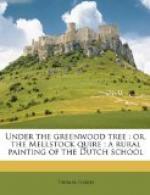“Are those all of them, father?” said Fancy, when Geoffrey had pulled away five.
“Almost all,—though I feel one or two more sticking into my shoulder and side. Ah! there’s another just begun again upon my backbone. You lively young mortals, how did you get inside there? However, they can’t sting me many times more, poor things, for they must be getting weak. They mid as well stay in me till bedtime now, I suppose.”
As he himself was the only person affected by this arrangement, it seemed satisfactory enough; and after a noise of feet kicking against cabbages in a blundering progress among them, the voice of Mr. Shiner was heard from the darkness in that direction.
“Is all quite safe again?”
No answer being returned to this query, he apparently assumed that he might venture forth, and gradually drew near the lantern again. The hives were now removed from their position over the holes, one being handed to Enoch to carry indoors, and one being taken by Geoffrey himself.
“Bring hither the lantern, Fancy: the spade can bide.”
Geoffrey and Enoch then went towards the house, leaving Shiner and Fancy standing side by side on the garden-plot.
“Allow me,” said Shiner, stooping for the lantern and seizing it at the same time with Fancy.
“I can carry it,” said Fancy, religiously repressing all inclination to trifle. She had thoroughly considered that subject after the tearful explanation of the bird-catching adventure to Dick, and had decided that it would be dishonest in her, as an engaged young woman, to trifle with men’s eyes and hands any more. Finding that Shiner still retained his hold of the lantern, she relinquished it, and he, having found her retaining it, also let go. The lantern fell, and was extinguished. Fancy moved on.
“Where is the path?” said Mr. Shiner.
“Here,” said Fancy. “Your eyes will get used to the dark in a minute or two.”
“Till that time will ye lend me your hand?” Fancy gave him the extreme tips of her fingers, and they stepped from the plot into the path.
“You don’t accept attentions very freely.”
“It depends upon who offers them.”
“A fellow like me, for instance.” A dead silence.
“Well, what do you say, Missie?”
“It then depends upon how they are offered.”
“Not wildly, and yet not careless-like; not purposely, and yet not by chance; not too quick nor yet too slow.”
“How then?” said Fancy.
“Coolly and practically,” he said. “How would that kind of love be taken?”
“Not anxiously, and yet not indifferently; neither blushing nor pale; nor religiously nor yet quite wickedly.”
“Well, how?”
“Not at all.”
* * * * *
Geoffrey Day’s storehouse at the back of his dwelling was hung with bunches of dried horehound, mint, and sage; brown-paper bags of thyme and lavender; and long ropes of clean onions. On shelves were spread large red and yellow apples, and choice selections of early potatoes for seed next year;—vulgar crowds of commoner kind lying beneath in heaps. A few empty beehives were clustered around a nail in one corner, under which stood two or three barrels of new cider of the first crop, each bubbling and squirting forth from the yet open bunghole.




